Jun 9, 2025 – Day 2 in Washington D.C.
Hello. Today is the second day in Washington D.C., where Sunim is meeting with U.S. government officials, members of Congress, and think tank representatives for peace on the Korean Peninsula.
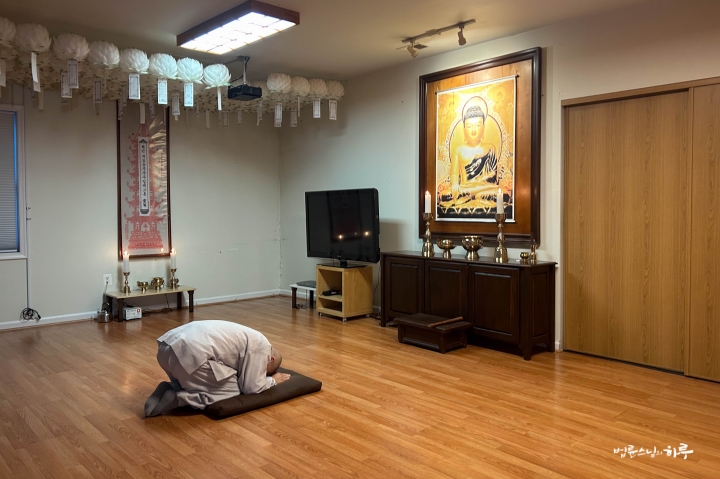
Sunim began his day with morning practice and meditation at the Washington DC Jungto Center. Feeling slightly better than last night, he went out for a walk, but unfortunately had to turn back when raindrops began to fall. After breakfast, he reviewed the Washington D.C. visit schedule and departed for the U.S. Congress. Due to the rain and it being Monday morning, the commute took longer than expected.
The first meeting was with Laura Rosenberger, an aide to Senator Andy Kim of New Jersey, the first Korean American elected to the U.S. Senate. Upon arriving at the Dirksen Senate Office Building, Laura warmly welcomed Sunim.
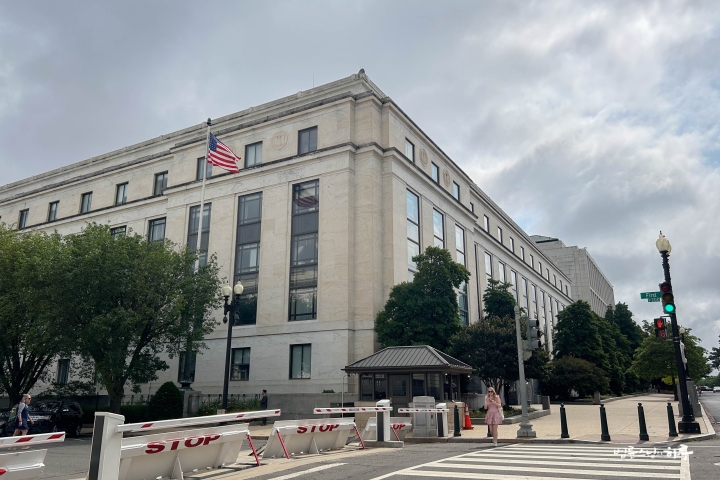
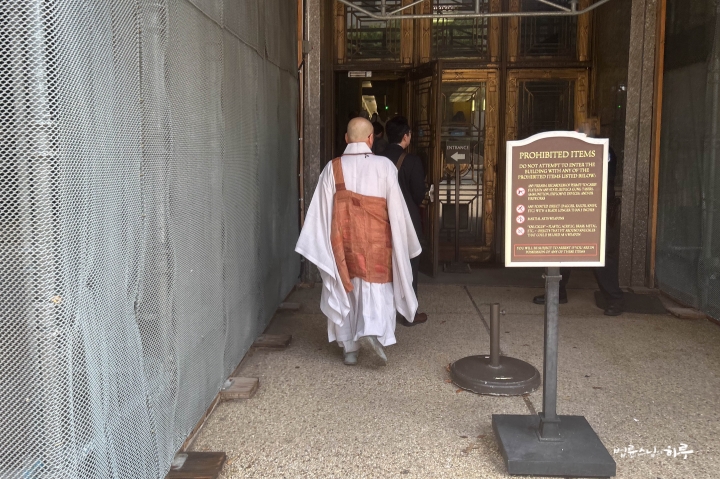
Laura had met Sunim long ago when she worked at the State Department’s Bureau of East Asian and Pacific Affairs and the Korea Desk. During the previous Biden administration, she served as the NSC’s Senior Director for China and Taiwan. They exchanged warm greetings after not seeing each other for a long time and had a pleasant conversation. She explained that Senator Andy Kim was busy and she had come in his place, promising to convey Sunim’s message well. As she has worked in the security field for a long time, Sunim exchanged many thoughts with her on bringing peace to East Asia. As the meeting concluded, they thanked each other for making time, and Sunim presented her with his English book <The Buddha : A True Revolutionary>.
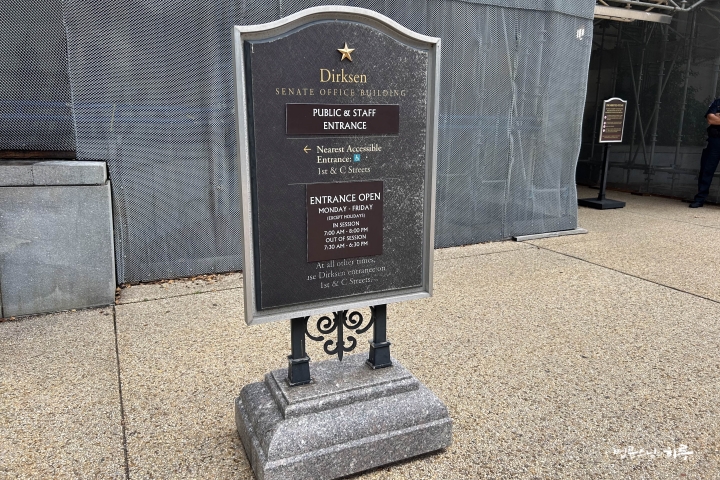
Next, Sunim traveled to Pentagon City, where the Department of Defense is located, to meet with Nina Sawyer. Nina is the Principal Director of the Nuclear and Counter-WMD Division. She had requested a Dharma Q&A session for Department of Defense staff at last year’s meeting, but expressed regret that it couldn’t be arranged this time due to scheduling conflicts. Sunim thanked Nina for making precious time in her busy schedule and presented her with his English book as a gift.
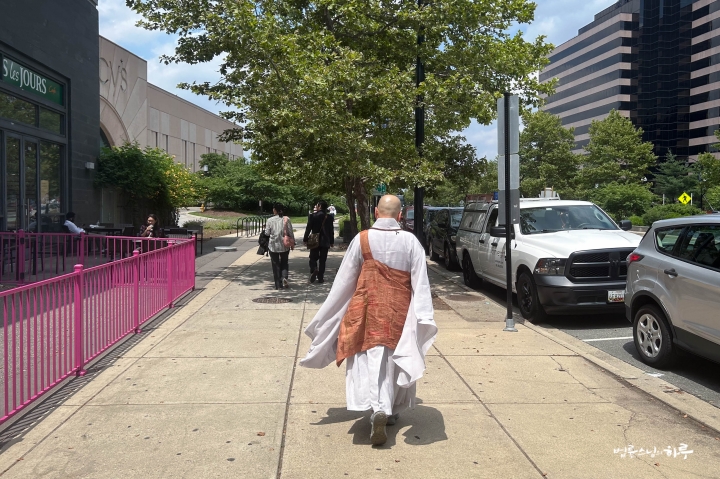
By afternoon, the rain had cleared and the weather became hot like midsummer. Many student groups on field trips to Washington D.C., the nation’s capital, could be seen along the streets. After moving to a nearby food court for a simple lunch of noodles, Sunim headed to NCNK (National Committee on North Korea) for a small group meeting with experts.
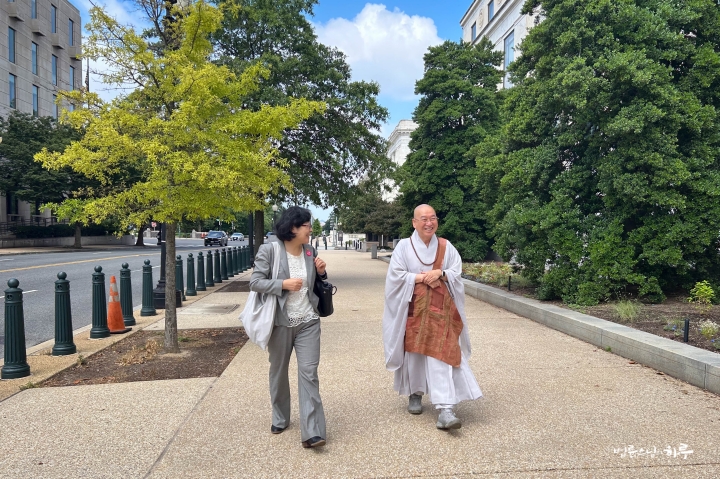
The National Committee on North Korea (NCNK) is a non-profit, bipartisan organization headquartered in Washington D.C., working to enhance understanding of North Korea and promote constructive North Korea policy. Founded in 2004, it includes North Korea experts, human rights organizations, academics, and humanitarian groups in the United States.
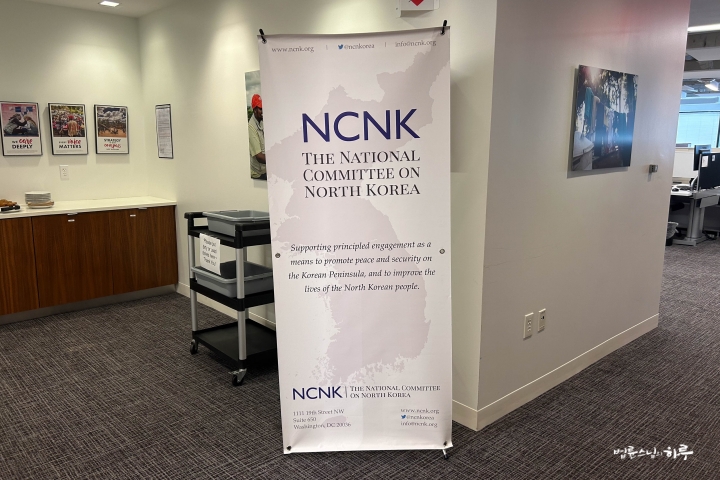
Upon entering the meeting venue, NCNK Executive Director Keith Luse and staff members warmly greeted Sunim. Keith, who served as an aide to the late Senator Lugar, former Republican Chairman of the Foreign Relations Committee, has long studied foreign policy issues. He has been in contact with Sunim for over 20 years and has been working to resolve North Korea issues for a long time.
Today’s small group meeting included Syd Seiler, who has long worked on North Korea and security issues at the State Department, White House, and think tanks, Ellen Kim, Education Director at KEI (Korea Economic Institute), and many NCNK staff members. After exchanging warm greetings, they spent about an hour discussing Korean Peninsula issues.
First, Sunim spoke about the purpose of organizing today’s meeting.
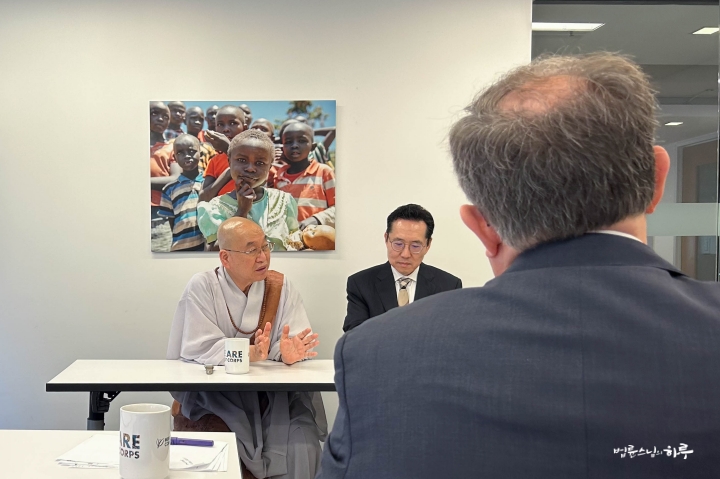
“My concern is to prevent war from breaking out on the Korean Peninsula and to help North Korean residents escape from suffering and live happily. I’ve been working on this for the past 30 years, but there hasn’t been much progress yet. With President Trump’s election this time, I have hope that we might find a clue to resolving the Korean Peninsula peace issue. If the Korean Peninsula peace issue is resolved, I expect that the problem of alleviating the suffering of North Korean residents will also be resolved. I don’t agree with all of President Trump’s policies. However, I have expectations regarding the Korean Peninsula peace issue. This is because the Korean Peninsula peace issue requires unconventional thinking to be resolved. I would like to hear your opinions on this, and please ask any questions you may have.”
Questions followed on various topics including improving U.S.-North Korea relations and humanitarian aid to North Korea. Sunim provided much advice on North Korea’s current situation and what North Korea policy the United States should adopt to improve U.S.-North Korea relations.
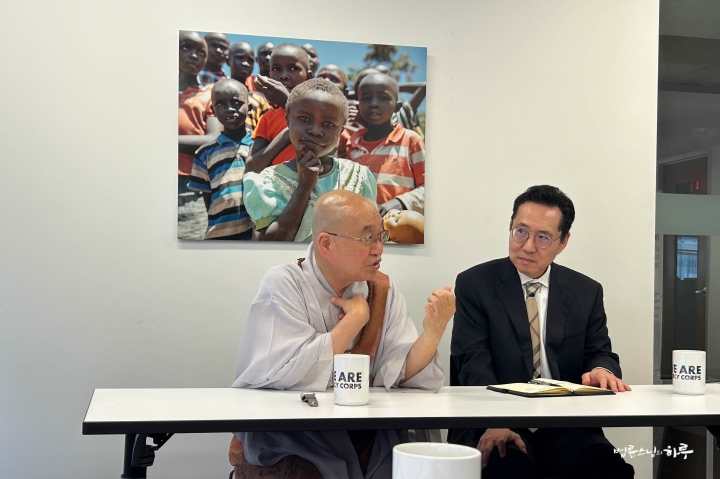
After the conversation, Sunim presented his English books to Syd Seiler and Ellen Kim.
Sunim and Keith then had about an hour more of meeting time together. Keith shared with Sunim various questions and episodes from when he first visited North Korea in 2002 and after returning to the United States. Keith also expressed his respect for Sunim, who has been working even longer than himself for peace on the Korean Peninsula, improving U.S.-North Korea relations, and humanitarian aid to North Korea. They concluded the conversation by agreeing to continue working together with a positive attitude. They agreed to meet again in September, and Sunim presented his English book as a gift.
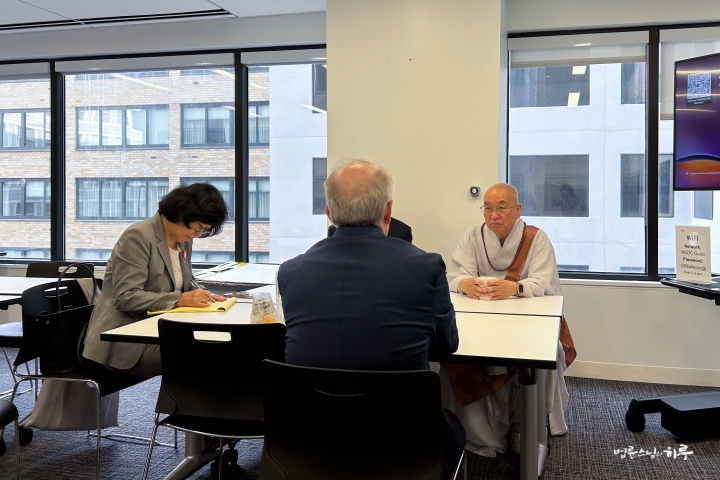
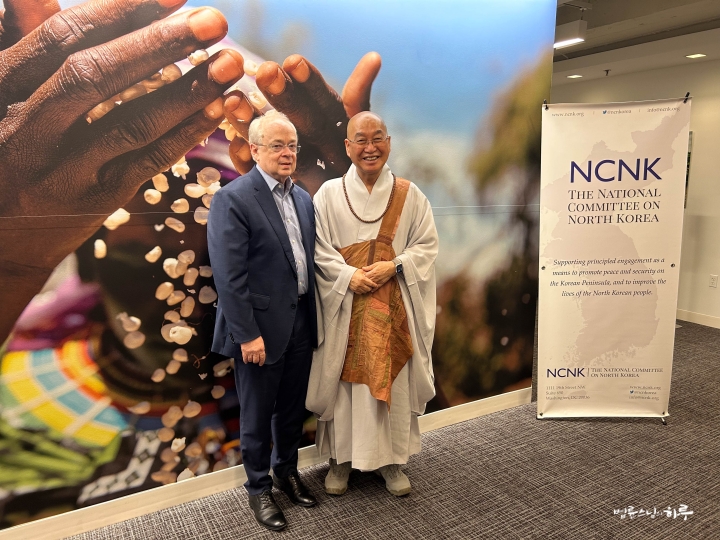
Next, they moved to the church where Rev. Rich Tafel had recently relocated. He explained that during the COVID pandemic, while conducting online services, they moved from a large church with high maintenance costs to a smaller space.
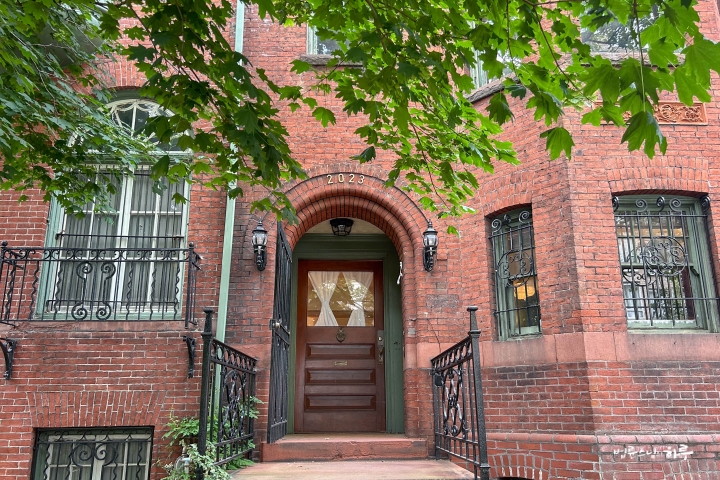
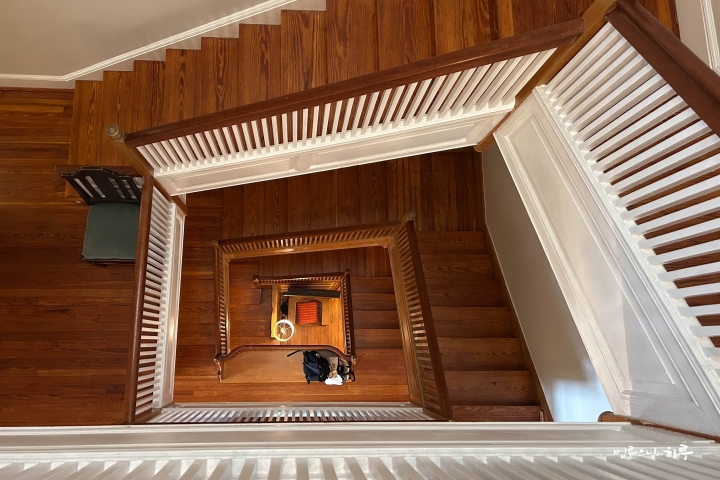
Upon arriving at the church, Annabel Park, who has a long connection with Sunim, and Rev. Rich warmly welcomed him. They had prepared a simple dinner, so they ate first. They enjoyed pleasant conversation over the delicious dinner carefully prepared by Annabel Park and Jungto Society members.
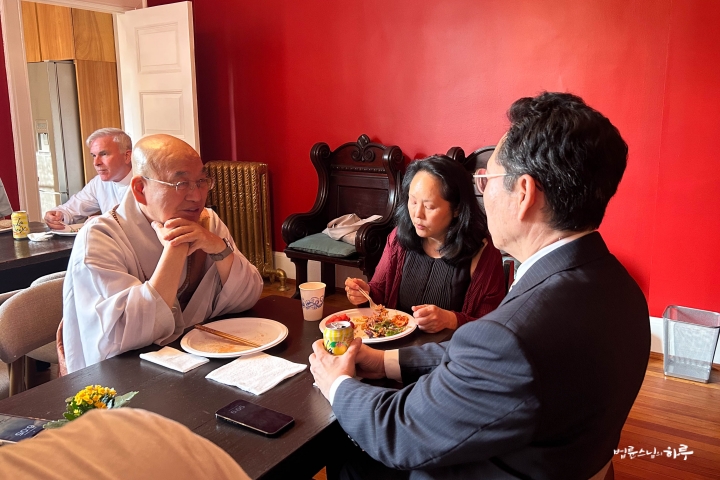
Today’s event was titled “Finding Spiritual Grounding in Uncertain Times: An Interfaith Dialogue with Venerable Pomnyun Sunim and Rev. Rich Tafel.” This was the third dialogue with the pastor, arranged to hear wisdom from both speakers’ perspectives on current American society’s anxiety and changes, as well as from their personal experiences. The session was conducted for an hour and a half with Zoom video conferencing and YouTube live streaming.
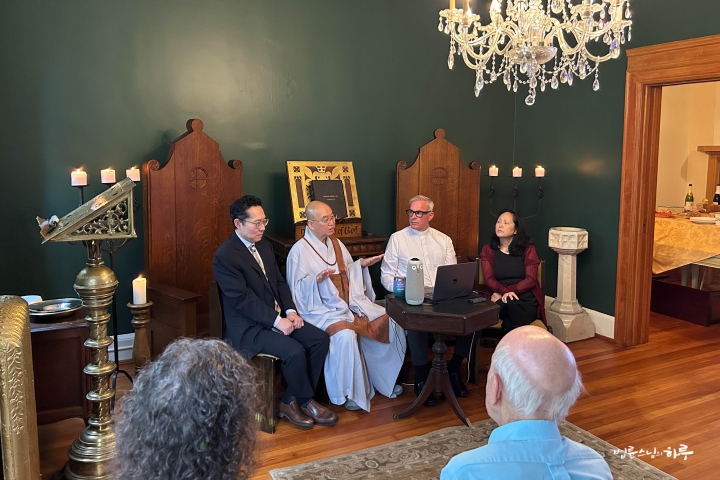
First, moderator Annabel Park asked both speakers questions.
What Is the Essence of Chaos in Our Rapidly Changing World?
Sunim answered first.
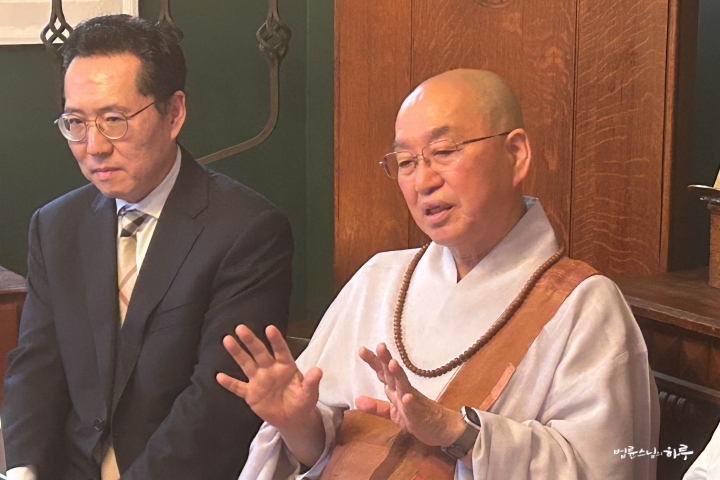
“Compared to periods we’ve experienced before, we can say that the pace of change is much faster now. As a result, we’re experiencing things we’ve never encountered before. First, we can mention the climate crisis. We have never experienced such climate problems historically. Because of this, many people don’t properly feel the crisis despite the serious situation. Perhaps not knowing might lead to even greater fear than reality.
When we think about how we handled the COVID pandemic we recently experienced, at first we neglected it because we didn’t properly understand the danger, and later we were so shocked that we practically stopped all movement and activities. Through such processes, we now have the capacity to manage the risk. Like that, I think if we understand the climate crisis more clearly, we might be able to manage it to some extent. However, it seems we still don’t have sufficient awareness of the climate crisis, so proper responses aren’t being made. I think we’ll only respond when the side effects appear seriously in 10 or 20 years and the danger is right before our eyes. Perhaps by then it will be too late to properly address it, and we may pay a heavy price.
Second is the change in international order. Humanity experienced much chaos and suffering during World War II. Countless lives were sacrificed, leading to deep reflection and the creation of the United Nations. Humanity decided to respond jointly for world peace. Thus, a world order centered on the United States was formed to some extent. Of course, there were conflicts with the Soviets during the Cold War, but in the broad framework, we can say that the U.S.-centered international order continued. Later, with the collapse of communism and the fall of Eastern Europe, the U.S.-centered world order became even more solid.

However, recently, the United States has been taking the lead in dismantling the international order it has helped establish. This has left us in a very bewildering position. We don’t know what to do as the familiar order suddenly collapses. Yet, a new order hasn’t been established either. We should view this as a period of transition in the global order.
So we need to think about the essence of this confusion. While confusion exists in the outside world, it particularly resides within our minds. When I look at the world and think “this is how the world is,” my mind isn’t confused. But when the current world cannot be understood through the systems or concepts I know, we feel confusion.
I think it’s more accurate to say the world is “changing a bit rapidly” rather than “chaotic.” We feel it as chaos because we don’t properly understand the world’s changes. Therefore, we need an attitude that properly recognizes and accepts this changed world accordingly. If we insist only on our own perceptions, we’ll only feel stable when the world returns to the old ways.
So there are two ways to respond to changes in the world. One is to return the world to how I perceived it in the past. The other is to understand the current changed world as it is through a new framework of perception. This isn’t about which choice is right. It’s about finding psychological stability through these approaches. The older or more experienced someone is, the more confusion they tend to feel in such situations. Young children can accept the world as it is because they don’t have fixed ideas formed in the past.
We need to newly adjust our framework of perception to more deeply understand the changed world. And if we think these changes are wrong, we need social action to return things to their original state. What’s important is how we perceive this world and how we will act. Just feeling anxious doesn’t help at all.”
After hearing Reverend Rich’s response as well, Annabel Park continued with questions and Sunim answered.
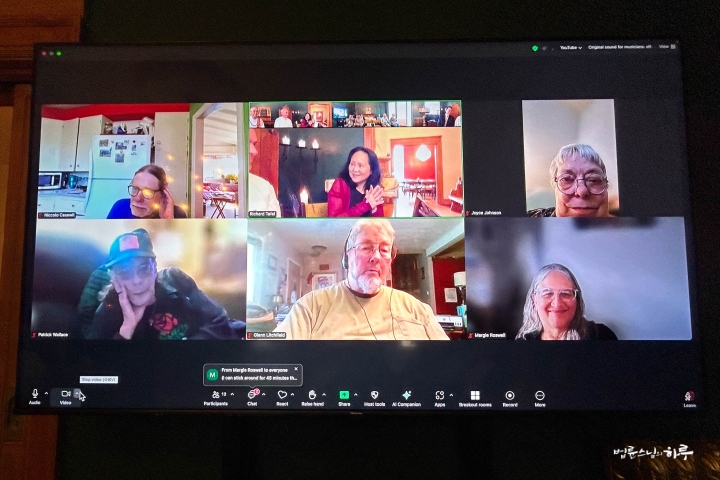
Is There a Compassionate Path That Doesn’t Lose Moral Clarity?
“Everyone has different values based on the environment they’ve lived in and the education they’ve received. So we must acknowledge that we are all different from each other. Respecting others’ beliefs or convictions doesn’t mean they are right or that you should follow them. What’s different from me isn’t wrong or incorrect – it’s just different.
When you acknowledge that others are different from you, anger doesn’t arise in your heart. You get angry because you think the other person is wrong. When it gets more severe, you may even demonize them. You move toward extreme thoughts like ‘such beings should not exist.’ Then violence and murder become rationalized, and war becomes justified. The wars happening around the world right now stem from actions based on this perspective. However, when you acknowledge differences, anger doesn’t arise, and when you’re not angry, you can see others as they are. Taking it a step further, you can understand others by thinking, ‘From their position, they could say that.’ This doesn’t mean they are right. It means they could think that way from their position.
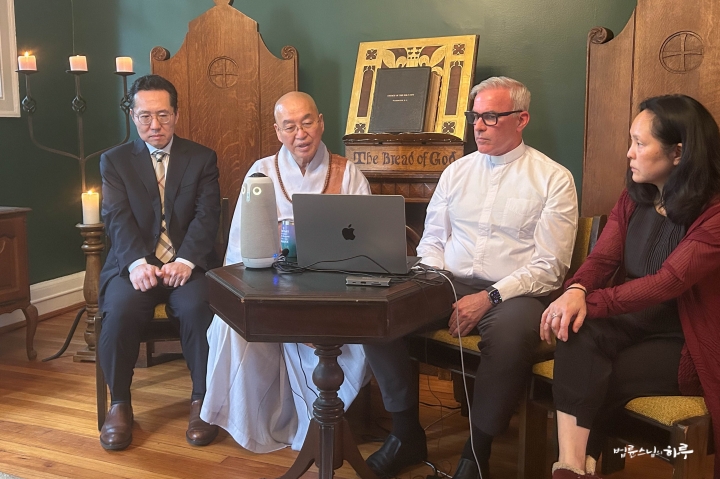
I believe this is love. Love without understanding becomes violence. Saying ‘I like you’ is merely my one-sided position. I believe that understanding the other person’s beliefs and actions from their perspective is true love. I may not agree with their thoughts. In such cases, I can express my own opinion. However, there should be no violence in those actions. We must find solutions through non-violent dialogue with those who have different thoughts. Through dialogue, we can reach mutual agreement, or if we cannot agree, we can each go our separate ways according to our own thoughts. Agreement is not the only path. When we have this perspective, peace can dwell in our hearts and in our relationships.
Although I have studied Buddhist teachings, there is a part of Jesus’s teachings that deeply moved me. Before Jesus died on the cross, he said this about those who crucified him:
‘Father, forgive them, for they know not what they do.’
What does this mean? Those who crucified Jesus were the executioners of that time. In today’s terms, they would be like prison officers. They didn’t think they were committing a sin; they were simply performing their job. If they were to be punished for this, how unjust would that be? Because Jesus recognized their role, he said ‘they know not what they do.’ This perspective transcends the limitations of ordinary people and represents the heart of God. This is why I believe Jesus was both human and divine.
As ordinary people, it’s difficult for us to have such a perspective. However, the reason we have faith is to move in that direction. Yet today’s believers show a different face from Jesus. Believers are often more hateful, resentful, and even violent. Religion underlies many of the world’s conflicts and wars. It’s truly ironic that most of the extreme acts occurring in today’s society originate from religion. Therefore, believers need to ask themselves not ‘which religion do I have?’ but ‘am I properly following the teachings I believe in?’ I think reflection and self-awareness about one’s faith are important.”
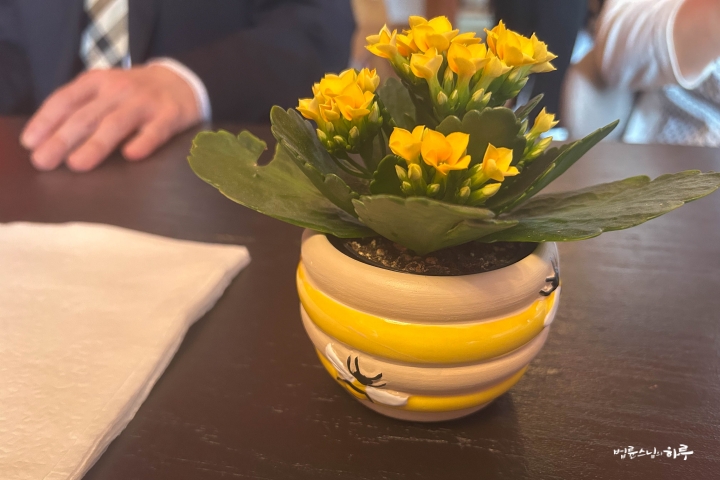
Next, Sunim and Reverend Rich had a time to ask each other questions. First, Reverend Rich asked Sunim a question.
What Would You Say to Those Who Call Compassion Weakness?
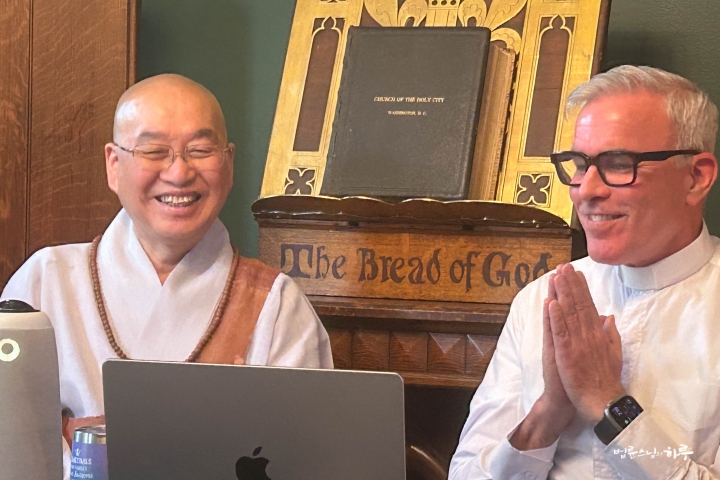
“I never once thought that being arrested by the police or being tortured would happen to me. I had lived a good life. But one day, it happened to me. At that time, I thought, ‘Anyone living in this world could face unexpected situations.’
A system exists where people are arrested and tortured. Is it more important that I not become a target, or is it more important that such a system itself disappears? At first, I also thought, ‘As long as it’s not me.’ But one day, I was the one who experienced it. From then on, my thinking changed. As I came to understand those who had no choice but to act that way in the given situation, my anger disappeared. However, I believed that such a system must be eliminated. If I hate and despise them, it will ultimately lead to revenge against individuals or against the group that created such a system. I believe that this type of revolution creates more victims and revenge. So I didn’t hate them. But I firmly believed that this system must be eliminated. That belief became my motivation to participate in social activities.
Even now, when I face injustice or discrimination, I believe we should not turn away but work together to improve things. Of course, it’s true that anger can generate great power in a short time. When you achieve your goals with such power, you feel great satisfaction. But if you fail, it comes with a tremendous sense of defeat. But what if we work steadily without anger? We can continue moving forward without giving up until we reach our goal. I don’t think this is simply becoming weak; rather, I think it’s the power to go all the way through peaceful methods. Some might evaluate it as losing strength, but I think it’s gaining the power to continue sustainably.”
Sunim also asked Reverend Rich a question.
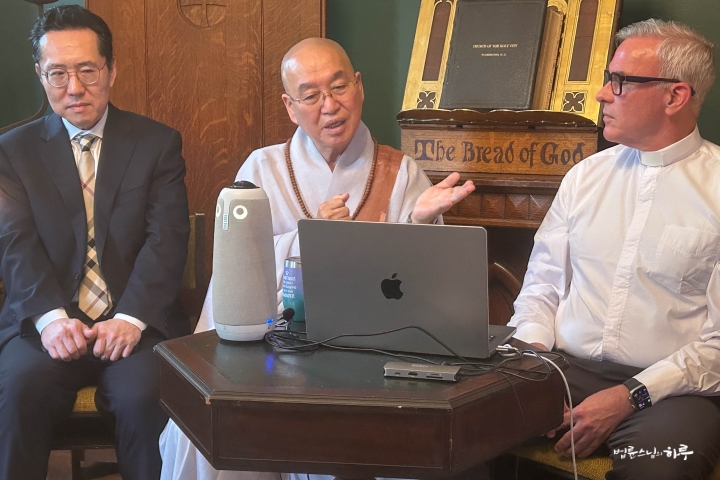
The Trump Era: The Beginning of a New System or the Start of Chaos?
“Now that President Trump has been elected, not only American society but the whole world is experiencing great confusion. I think this phenomenon is not simply good or bad, but a problem that arises because it breaks down the existing order. It’s been nearly 80 years since World War II ended. Society has changed a lot during that time, and in some ways, a new system is needed. Is this situation a starting point toward a new system? Or is it the beginning of worse results by destroying the existing system? What do you think, Reverend?
Of course, we can only evaluate this after passing through this period. Looking back decades later, we’ll be able to assess whether it was a departure toward a new system reflecting a changed society, or the beginning of fierce competition and chaos like another world war. We can’t know for now. But since you live in America and directly see the demands and changes of American citizens, I’m curious how you view this situation. Since we don’t live here, it feels somewhat confusing. But the fact that this happened here means there were certain demands from the people here, doesn’t it? What demands from citizens led to the Trump administration and these events?”
Reverend Rich responded.
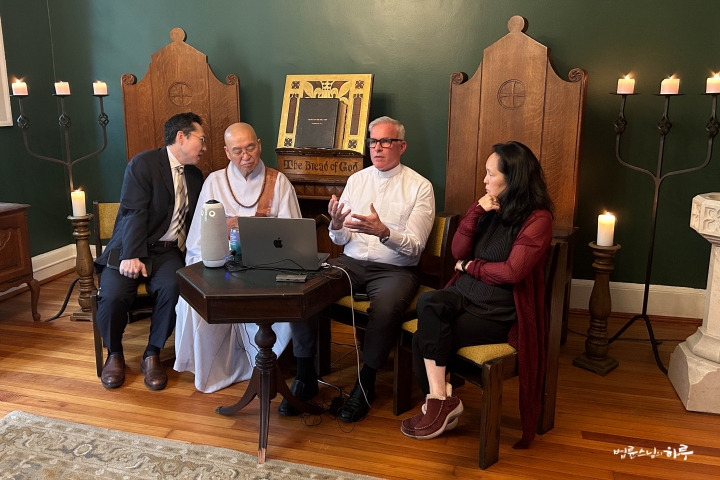
“We think of what’s happening now as the Trump phenomenon, but actually, in both American parties, there was a boiling sentiment of ‘we’re tired of supporting the countries we helped after World War II.’ On top of that, former President George Bush took a very aggressive foreign policy of ‘we must bring democracy to the world.’ The Iraq invasion, as we later learned, was based on very inaccurate information and was poorly executed, which I think led to instability in the Middle East. American citizens became even more dissatisfied.
‘Why should our soldiers die in Iraq? Why should our soldiers die in Afghanistan? Why should young people have to do this? Why should we be the world’s police? What are we getting out of it?’
The reason Americans have these questions is because even in America, there are no proper roads, teenagers are using fentanyl, and there are no jobs. America has lost out through globalization, and people are saying ‘enough is enough.’ So I think it’s not just Trump’s problem but a problem of both parties. The worldview that America plays the role of police in various parts of the world has lost its power. I think this isolationism will bring catastrophic results, but I think Americans will have to learn from this again.”
After hearing Reverend Rich’s response, Sunim also shared his opinion on this matter.
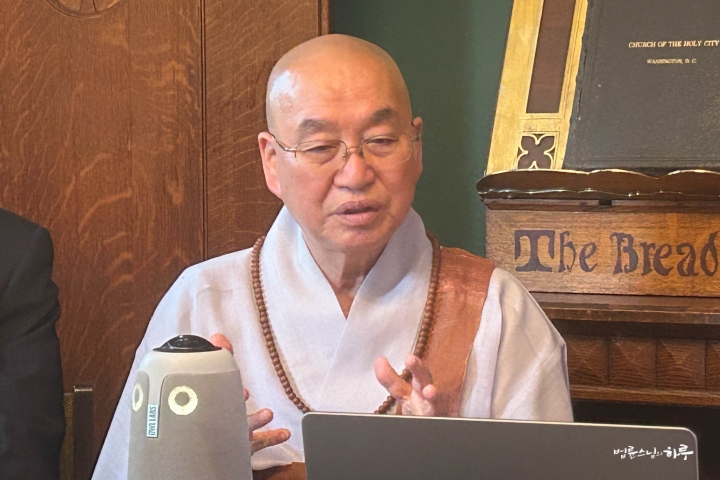
“Since America exercises the greatest influence in the world, this is not just America’s problem but the world’s problem. Korea has also experienced political turmoil over the past few months. That was Korea’s turmoil, not America’s. But the current turmoil in America is being experienced by everyone around the world. Also, America’s stability leads to global stability. This isn’t a problem that can be solved simply by saying ‘we don’t want to influence the world.’ The world has already been moving centered around America until now. So if possible, I hope American citizens can find a path that benefits both America and the entire world.
Especially now in the era of climate crisis, the world needs to cooperate more. Problems like the COVID pandemic are also easier to overcome when the world cooperates. But reality wasn’t like that. In solving these problems, we chose the path of every country for itself rather than cooperation, and as a result, the confusion grew bigger. I think any country, even America, needs to have a mindset that goes beyond its own country to solve humanity’s problems as a whole. I don’t mean America should be responsible for everything. But shouldn’t it play some role? Even if not through military power, I think we need a role that facilitates cooperation. In that sense, I feel somewhat disappointed.”
Finally, Annabel Park asked both of them what they pray for these days. Sunim answered first.
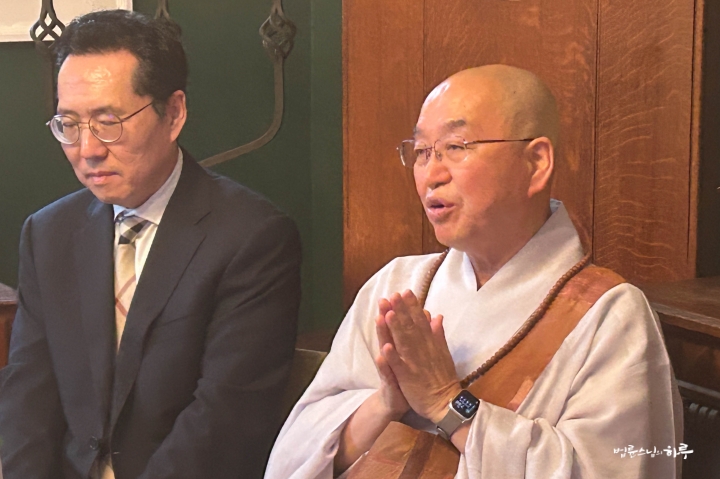
“Peace on the Korean Peninsula is my greatest wish. Second, I hope North Korean residents can escape from life’s suffering and enjoy a better life. And these days, individuals in the world are living in material abundance yet experiencing tremendous stress. I hope people can be free from stress and be happy.
People think consuming a lot is the way to live well, but we need to change this thinking and find ways to live happily while consuming less. The core of the climate crisis our Earth is facing lies in excessive consumption and the resulting carbon dioxide emissions. In other words, we can only solve this problem by reducing consumption. We cannot escape the climate crisis with consumption-oriented values. So I continue to talk about this issue and try to practice it in daily life, but consumption addiction has spread throughout humanity like drug addiction, so it seems realistically difficult to escape from it.”
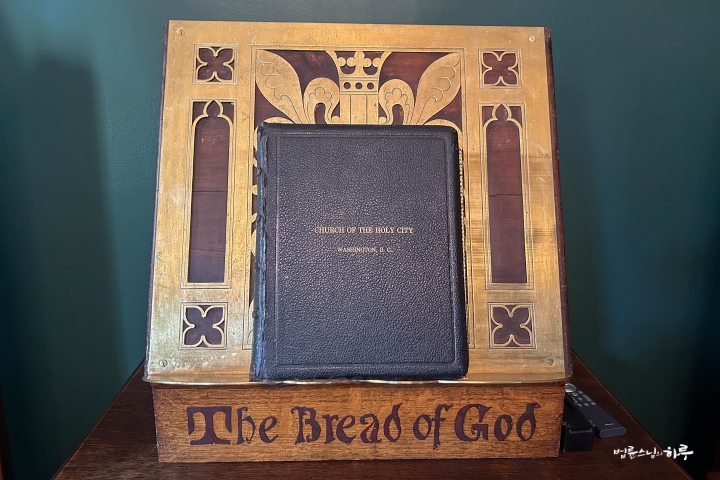
After hearing Reverend Rich’s response, questions were taken from both Zoom participants and those present in person. One person raised their hand and asked Sunim a question.
How Can We Maintain Peace of Mind Without Being Seduced by False Hope?
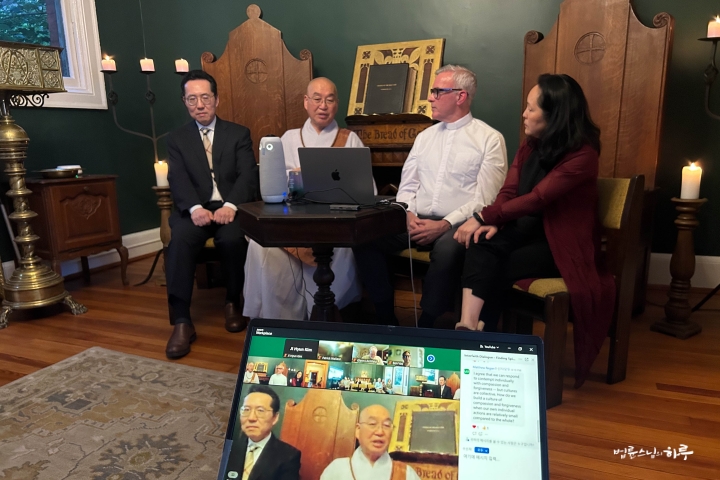
“When we observe something for a short period, we tend to see it in terms of success or failure, winning or losing. However, when we take a longer view, we realize it’s simply part of our journey toward our goal. Therefore, I hope we don’t view everything through the lens of success and failure. We are in the process of moving toward our goals through countless failures. What seems like failure now, when viewed within the whole process, might be better understood as ‘practice’ rather than ‘failure,’ don’t you think?
I personally hold this perspective. Whatever I’m doing now, I give it my all as if it were a competition. However, once it’s over, I consider it to have been practice. All past events were practice, this present moment is the competition, and it too will become practice once it passes. What this means is ‘do your best but don’t be attached to the results.’
With this perspective, there is no failure. Everything becomes experience. As these experiences accumulate, we move toward a higher probability of success next time. If we live with this perspective, we can maintain equanimity without being too discouraged by immediate setbacks.”
After taking one more question, the third dialogue session concluded. Everyone expressed gratitude for the increasingly profound discussions and successfully wrapped up the event.
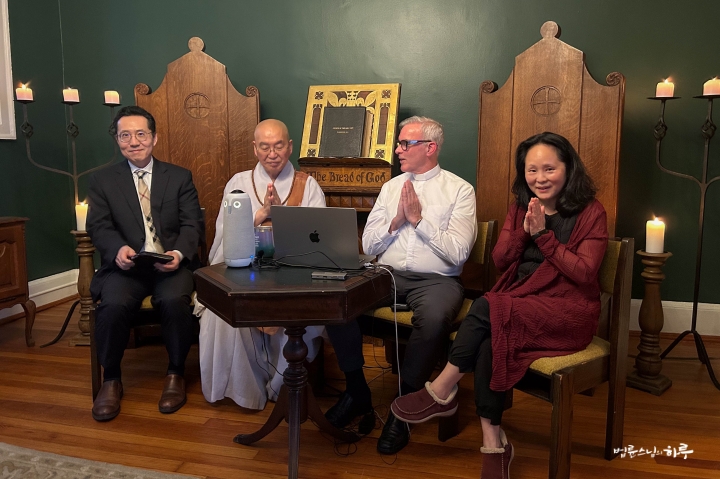
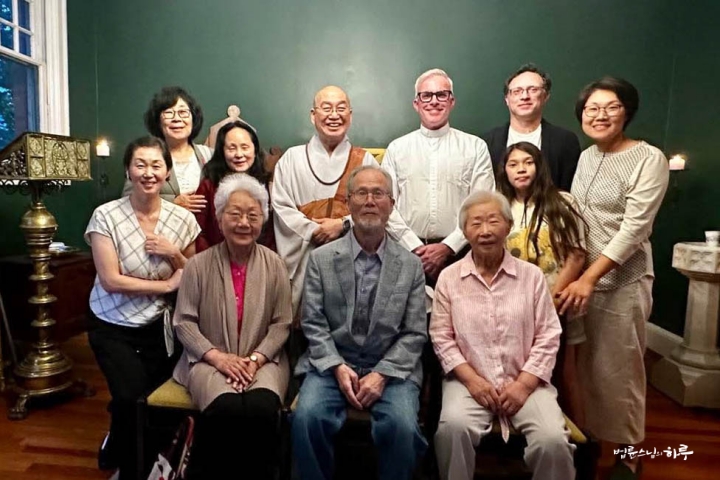
After taking photos with those present, Sunim apologized for not being able to speak much due to feeling unwell. He presented his English books as gifts to Annabel Park and Reverend Rich, who had organized the event.
“In Korea, it’s traditional to give a donation as a gift when someone moves to a new place.”
Sunim spontaneously donated the money he had with him to Reverend Rich, who expressed his gratitude. The building was old and needed remodeling, including window replacements. Sunim expressed regret that if he had known they had recently moved in, he would have prepared a larger donation in advance.
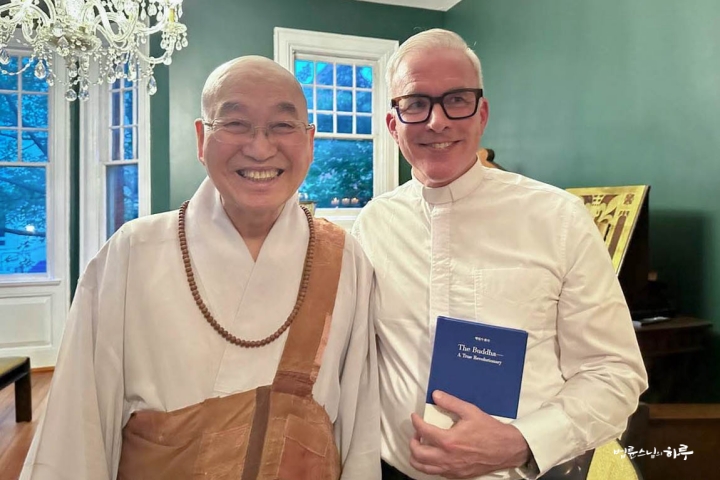
After saying goodbye in front of the church with promises to meet again, they headed to the US Jungto Society center. Upon arrival, Sunim had a meal prepared by Jungto Society members and then took some rest.
As he has done for the past 30 years, Sunim continues to meet people with sincere dedication, working toward improving North Korea-US relations, peace in Asia, and humanitarian aid for North Korean citizens. We’ll continue to share updates tomorrow.





